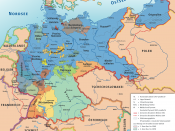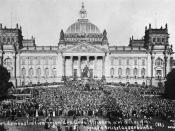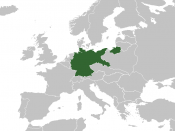Hitler and the Nazi's rise to power was one of chance and circumstance. His alternative views to mainstream politics struck a chord with the people. He was a charismatic orator, with a style of leadership unprecedented in German politics. He was able to channel Germany's hatred for the Weimar Republic, Treaty of Versailles and minorities into support for his National Socialist Party, which subsequently allowed him to gain power legitimately. Hitler had the ability to manipulate events so that he could gain widespread popularity. He controlled power by installing fear and sustained a myth about his leadership fuelled by propaganda. Hitler's rise to power was one of necessity, manipulation and circumstance, all of which seemed to play directly into his hands.
The Treaty of Versailles signed by Germany in 1919 could be acknowledged as a long-term catalyst for the rise to power of Nazism in Germany, but in the interim, support for the Nazis as a direct result of the treaty was negligible.
While the Germans felt betrayed by the callous terms placed on them by the treaty, they were not influenced to vote for the National Socialists. This is supported by the fact that during the early post war period (1918-28), the Nazis failed to gain a seat in the German parliament and regularly failed to record over three percent of the popular vote. Therefore, this would indicate that the Treaty of Versailles exerted little influence in the rise of Hitler, in the short-term. However, the long-term repercussions of the treaty helped the Nazis gain appeal by the fact that during the late Twenties, Germany suffered the effects of the Depression greater than any other country due to the Treaty. This was because Germany was forced to pay war reparations in excess of thirty-two billion American dollars to...


